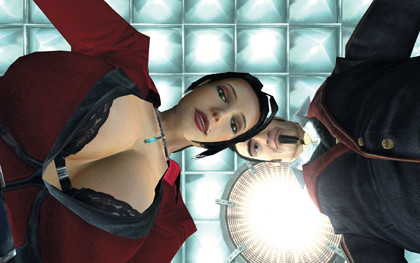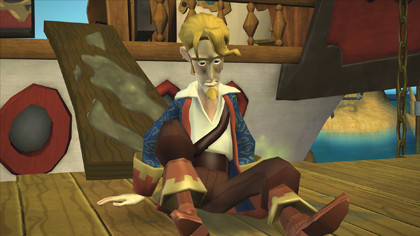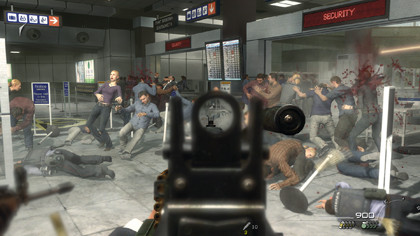How games create emotional connections
Sign up for breaking news, reviews, opinion, top tech deals, and more.
You are now subscribed
Your newsletter sign-up was successful
I, lover
Love. In 2009, a Japanese man calling himself Sal9000 officially married the love of his life, Nene Anegasaki, in front of witnesses and a priest. The catch? Nene is a cartoon character in a Nintendo DS game called Love Plus.
When we talk about games exploring love, we don't really mean this. That doesn't mean that games can't touch our hearts, just that it tends to be by proxy. An in-game relationship is typically about living vicariously through the fiction, about enjoying the sentiments that build up between our characters rather than sharing in the chemical obsession.
This can take many forms. Prince of Persia: The Sands of Time tells a fantastic, largely non-interactive romance between the Prince and Farah, the daughter of one of his enemies, primarily via the softening of their rocky relationship throughout the game and the dilemmas they face.
Many Japanese eroge games are about hooking up, frequently but not exclusively in horribly pornographic ways. Other times, the romance is optional – something to pursue with your party as you quest around your world, slaying dragons and taking on the latest big evil.

ROMANCING THE PAD: Overly sexualised characters tend to be shunned. For all the silly costumes, gaming remains surprisingly conservative
As with escort missions, the obvious tricks rarely work. The princess at the end of the game is usually an irrelevance. We don't know her. We don't care. Likewise, the hyper-sexualised characters are typically forgotten almost as soon as they appear. Sure, everyone knows Lara Croft, and Elexis Sinclaire has her fans, but nobody really remembers or cares about FAKK2, Kimberly Stride or Lula.
Sign up for breaking news, reviews, opinion, top tech deals, and more.
Instead, much like real life, we like the people who make us like them – the ones who make us laugh, the ones we can sympathise with, the ones we want to spend our time with. There's nothing shameful about enjoying the sight of a soaking wet Lara Croft stretching after a dip in a river, or getting a kick from the way Bloodrayne almost orgasms as she feeds on a Nazi – but chances are that it's a witty, likeable character who looks like they chose their own clothes that really makes a personal impact.
Aeris and Tifa from Final Fantasy. Jade from Beyond Good and Evil. April and Zoe from the Longest Journey games. SHODAN from System Shock. What? Listen to the voice, she's hot…
Female gamers have it tougher. Generally, developers assume a male player, controlling a male character, with the love interests therefore primarily female. To pick on Bioware, although it's not the worst offender, Baldur's Gate 2 offered three girls of varying personalities and one utterly obnoxious guy, while the Mass Effect series is quite happy to let you play as a lesbian Shepard (romancing Liara in the first game, and Yeoman Chambers in the second) but carefully avoids any man-on-man action for a male Shepard. At least both do still get some decent romance options.
It's ironic therefore that Dragon Age has one of the best gaming romances ever, and it's one for girls only (or at least, anyone who plays as a girl, which seems to be almost everyone in our office). His name is Alistair – slightly geeky, very sarcastic, often surprisingly awkward. He's not the only romance in the game, but his background and role within it, coupled with Bioware's phenomenal attention to detail makes it practically the backbone of the main plot.
Unlike most game romances, jumping into bed with your intended quarry isn't the end of the story – the relationship forged there extends right to the end, and has consequences far beyond the stat bonus all the characters are awarded for getting lucky with the player character. We're not going to give away too many details, save that we've rarely played a game where going against an NPC's hopes and dreams felt so much like betrayal.
This relationship works on many levels. Alistair being funny means you want to spend the time with him, whether he can be romanced or not. He's the first NPC you get, so you spend a fair amount of the game with him (along with Morrigan, the other crucial plot character), whereas later characters can largely be swapped out and ignored, or perhaps never picked up at all.
The romance itself is carefully balanced. Fair or not, the standard in fiction is for the guy to make the first move, even when the girl is the hero of the story – in this case, by giving you a rose. After that, there's more give and take, with conversation options built around laughing at jokes, playful teasing and gradually building a connection, with the player character ultimately getting him to overcome his virginal nerves and into her bed.
The result is a relationship that doesn't simply feel like the kind of unsophisticated conquest that you'd fi nd in most games, but rather a mutual expression of love, and one whose real satisfaction comes in seeing him so happy. The fact that later decisions and plot twists can shatter it… what can we say? Love hurts.
I, friend
Friendship may be a softer emotional connection, but it's one that most players are much more willing to admit to. Spend £30 to ogle Lara's boobs? Sad. Spend ten years on tenterhooks waiting for another chance to sail alongside Guybrush Threepwood? Perfectly acceptable.
Unlike love, friendship has the advantage of not necessarily having to build to anything. We can enjoy the characters for what they are, and in many more ways. We don't have to feel their loss to empathise with it, we don't have to share their obsessions to want to see them achieve them, we don't need them to be real to feel guilty about screwing them over.
At its most ridiculous, Portal managed to make us feel bad about throwing a crate into an incinerator – a crate identical to every other box in the game except for a heart stencilled on its side and a computer voice calling it the Weighted Companion Cube. Valve now sells soft toys of the Cube on its website. Cuddly toys of a crate! A crate!

HAVING A LAUGH: A character who makes you laugh is that much closer to being a character you connect with
Just being there isn't enough, and much like love interests, the more forced they seem, the less most people end up liking them. The wacky comedy sidekick is typically either the best character in the game, as with the very Joss Whedon style Alistair in Dragon Age, or fingernails down a ten hour long chalkboard.
Everything from the words that come out of their mouth to the way they dress has an impact – first impressions count. A character who seems comfortable in clothes that you can imagine them picking themselves is that much closer than someone in a gratuitously sexualised outfit – even if there is some overlap, like Harley Quinn's ridiculous night nurse gear in Batman: Arkham Asylum, or Jack/Subject Zero's 'trying too hard' mass of elaborate tattoos and skimpy clothes in Mass Effect 2.
Somewhat darkly, the main reason to build up a character as likeable or sympathetic is that it's the best way to make the player care when they get hurt – instilling a sense of guilt if it's the player's action that causes it, anger if it's the villain responsible, or simply sympathy for a horrible situation.
Planescape: Torment arguably plays with this more than anything else. While it's not revealed for a fair way into the game, with the main character being an amnesiac immortal it quickly becomes clear that your character – to be exact, previous iterations of this amnesiac cycle – are responsible for almost every horrible thing you encounter, from the ghost of a woman he manipulated into loving him and then had killed so that she could be his bitter spy, to forcing a broken warrior-philosopher into servitude.
While most peoples' path through the game will be less evil, that's not essential – you can sell party members into slavery, murder people for fun and completely screw up innocent lives on a whim. Occasionally though, even a good player will be faced with a choice – notably when a pillar of skulls down in the D&D equivalent of Hell demands that you sacrifice one of your party in exchange for some vital, plot - unravelling information.
With the benefit of the right stats, you can play the system – shoving poor floating skull Morte back into his deserved punishment and then swiftly getting him back out before he slips to his eternal doom – but otherwise, the description of him being swallowed up for ever is a truly horrible, chilling moment you can't not feel bad about. Luckily, there are other alternatives too – but that's the one that really sticks in the mind after finishing.
I, victim
We started by saying that the player is largely immune to anything the designers can throw, but really, that's not the case. No, there's no reason to be scared of the dragon, and a new life is just a reload away. Doesn't matter.
The flipside of games simply being fiction is that the player is ultimately the only one that can be truly hurt by anything that goes on, the only one for whom it actually matters. If any moment in a game has meaning, that's why.
Take the most famous one of recent years – the nuke in Call of Duty: Modern Warfare. In a game filled with death and destruction and with a body count that makes the entire Rambo series look like My Little Pony, only one moment tries to make death anything less than cheap: the first-person demise of your own character in the aftermath of a nuclear blast.

COD4: We kill thousands of people in shooters, often innocents. Why does Modern Warfare 2's infamous No Russian level feel so different?
While he doesn't have much character of his own, and most players probably don't even remember his name, in those moments as we claw him through the wreckage before his inevitable death, we feel connected to his suffering. Few games have ever offered that.
Many more will in the future. As our technology improves, so too does the subtlety with which games can tell their stories. 3D characters capable of making eye-contact, of saying one thing while their faces say another, of interacting with their virtual words instead of just spitting out lines of canned dialogue.
New interaction methods that can add extra senses to the experience, as seen in a very primitive form with the Nintendo DS (particularly in games like The Rub Rabbits! series, with mini-games that include sweet stuff like holding a girl's hand on a walk in the park). AI capable of doing more than just following a flowchart in deciding how best to respond.
All of these and more are just a sampling of how games are going to learn to make us love them, and hurt us for it in the future. Phrased like that, it may not sound like much fun, but that pain could well be what makes games the most powerful storytelling medium ever. And that day is coming soon.